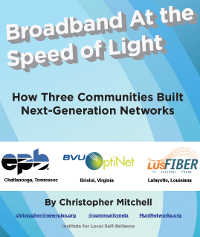
Fast, affordable Internet access for all.

After the FCC chose to overturn federal network neutrality protections on December 14th, 2017, open Internet advocates and elected officials that favor network neutrality have sought avenues past the Commission to reinstate the policy. In Louisiana, four groups of citizens organized together to form Team Internet and stage Louisiana rallies in four cities in January. Their goal was to bring attention to the overwhelming opinion that network neutrality benefits Internet users and to convince Senator John Kennedy that he should vote to block the harmful FCC decision.
Fight for the Future (FFTF), Free Press Action Fund, and Demand Progress worked together to form Team Internet, which organized protests in Lafayette, Shreveport, Baton Rouge, and New Orleans at Kennedy’s offices. At the Lafayette office, a group of advocates led by Layne St. Julien presented petitions with more than 6,000 signatures to Kennedy’s deputy state director, Jay Vicknair. The petitions urged Sen. Kennedy to use his vote to overturn the FCC action.
According to Vicknair, constituents have called and emailed the office in numbers rivaled only by last year’s healthcare debates.
Advocate Tool, The CRA
Proponents of network neutrality — mostly people, companies, and entities that aren’t big ISPs — consider the FCC’s order harmful. In order to regain network neutrality protections, which would remove the threat of paid prioritization and better ensure an open exchange of ideas online, advocates hope to use the Congressional Review Act (CRA). Under the CRA, Congress can reverse the FCC decision within 60 legislative days of it being published in the Federal Register as long as there is a majority vote. At last count, 50 Senators had committed to supporting a reversal. Public Knowledge has created a quick video describing the process:
At the recent Team Internet protest, attendees called on Kennedy to “be a hero” and be the 51st.
In A Net Neutrality Zone
Kennedy’s Lafayette office where St. Julien and other activists met Kennedy’s staff, operates in a community where the publicly owned network has already committed to network neutrality. LUS Fiber has been offering Fiber-to-the-Home (FTTH) since 2009 after several years of delays, lawsuits, and restrictive state laws impeded progress and tried to stop the community’s project. In 2005, the community voted to move forward with the project in order to spur economic development and to bring Internet access to the entire community.
Before AT&T acquired BellSouth, it did all it could to stop the FTTH project, including teaming up with Cox Communications and the American Legislative Exchange Council (ALEC). The group exercised significant influence on the state legislature to push through a bill that discouraged future local investment in publicly owned municipal networks. Later ALEC influence over state laws interfered with Lafayette’s timely deployment because legislation paved the way for more litigation. The city ultimately prevailed, but the delays were costly.
ALEC and its political influence has also interfered with local government’s ability to require ubiquitous cable service, reducing local revenue from franchising and allowing providers to serve only the most profitable areas. As a result, the digital divide has grown in lower-income neighborhoods. Big ISPs like Cox and AT&T also fueled then Governor Bobby Jindal's decision to reject $80.6 million in federal stimulus funds for rural broadband in 2011.
Layne St. Julien, who worked with her husband John on the Lafayette campaign, remembers the effort well:
“The fiber fight gave us all a good grounding in technology and network issues,” St. Julien told 50 States after delivering the net neutrality petitions to Kennedy’s staff. “We understand the power of networks here. We’ve benefited from the presence of network competition in our community. We’d like to see the rest of the country see those benefits, as well.”
John passed away in 2016 but Layne continues the efforts to protect the Internet access local communities depend on for opportunity, education, and economic development. With Layne’s permission, we archived many of the posts from the “Lafayette Pro Fiber Blog,” which John used to help educate the community in order to dispel misinformation put out by the big ISPs trying to block the project.
We encourage you to also listen to John talk about community action during a 2014 MAG-Net Cohort Call and during episodes 94 and 19 of the Community Broadband Bits podcast.
You can also learn about Lafayette’s journey from idea to implementation of their LUS Fiber system by downloading our report, Broadband at the Speed of Light.

Next Big Action Planned
On February 27th, Fight for the Future, Demand Progress, and the Free Press Action Fund as Team Internet are planning Operation:#OneMoreVote. They’ve enlisted a large collection of websites to encourage their visitors to take action. Participants include Tumblr, the ACLU, and Consumer Reports. Operation:#OneMoreVote provides script for alerts, links to apps, banner ads, suggested social media content, and other tools to help with the campaign.
Team Internet hopes and believes that constituent pressure can help federal officials with unsteady support for network neutrality. They may only need some indication that voters consider the issue a priority.
When Team Internet marched in Louisiana, Laila Andelaziz from FFTF commented:
“Weeks after the FCC’s wildly unpopular vote to repeal net neutrality protections, Internet users throughout the U.S. are still angry and they’re looking to their members of Congress to overrule the FCC’s repeal,” Abdelaziz told 50 States in an email. “Senator Kennedy has made it clear that he knows how important preserving the open Internet is to all Americans so that’s why small business owners, educators, students, and people from across the political spectrum came together in Louisiana today to ask Senator Kennedy to be an Internet hero and publicly support the net neutrality CRA vote. We know that Senator Kennedy is listening, now we hope he responds.”
